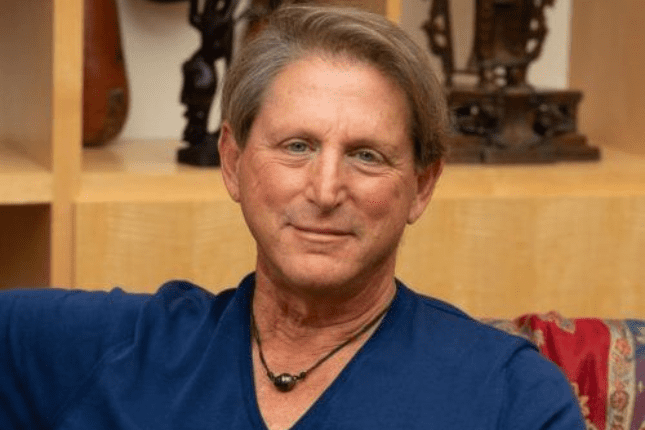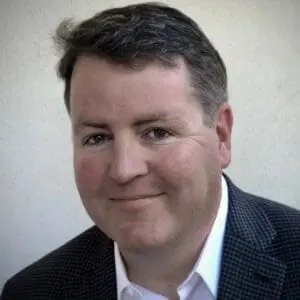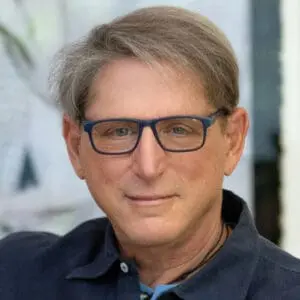We live in a world of conflicting messages, and many of them come from our own profession.
We’re told to prioritize ourselves above all else, but that true intimacy involves putting others first; to maintain firm boundaries, but that true happiness involves being vulnerable; to value self-sufficiency, but that relationships are the ultimate source of grounding.
So, when confronted with the sometimes contradictory drives for self-expression and nurturing relationships, where should we channel our efforts? We’re certainly not the first profession to wrestle with this dilemma, as the battle between pursuing individual and collaborative interests has been the fodder for philosophical debates since time immemorial.
Terry Real, couples therapist, founder of Relational Life Therapy (RLT), and author of I Don’t Want to Talk About It: Overcoming the Secret Legacy of Male Depression (a bestseller for over 20 years), chose to delve into the heart of the issue with his new book, Us: Getting Past You and Me to Build a More Loving Relationship. In it, he challenges couples to move beyond either/or thinking and into an egalitarian relationship that encourages both personal and relational growth, as difficult as that may seem.
As Bruce Springsteen writes in the book’s forward: “Terry’s writing is loving and kind, clever and strong, and he’s written a beautiful and important book, particularly for the moment we are in.”
– – – –
Ryan Howes: You initially gained renown as a therapist with your book I Don’t Want to Talk About It and your work with men’s depression. How did you get into couples work?
Terry Real: I started doing couples work because I found that what was most effective in working with men was teaching them about relatedness, and this has its roots in how men and women socialized differently. If you read the literature, girls and women often grapple with disempowerment during adolescence, losing their voices and becoming overaccommodating. Boys and men, in contrast, often disconnect—from their vulnerabilities, from their hearts, from other people. They’re taught to be tough and autonomous.
So I began to believe that healing for men lies in reconnecting them to themselves and to others. So I started by working on reconnecting them to the relationships they were already in. That naturally led to working with women as well.
RH: Aren’t women more naturally relational?
Real: Well, not naturally, but because of the way they’re socialized, they often have more relational sensitivity than most men. But a lot of women shift from this traditionally feminine side, which is individually disempowered but relationally sensitive, to the traditionally masculine side, which is individually empowered but relationally disconnected. And a lot of men are shifting to the traditionally feminine side.
Instead of shifting sides, I want to work on what I call loving power, which is a way of boldly standing up for yourself and cherishing your partner and the relationship, all in the same breath. It has to be taught, because it’s not common in our culture. Under patriarchal individualistic culture, you can be powerful or you can be connected, but you can’t be both at the same time. I believe that leading people into increased intimacy is synonymous with moving them beyond this culture of individualism.
RH: So we’re talking about egalitarian relationships?
Real: That’s right. And all the research tells us that egalitarian marriages produce happier, less neurotic, less depressed, less anxious people than do traditional hierarchical marriages. There’s no ambiguity there. So as therapists, we have an obligation to stop soft-pedaling and make this clear in no uncertain terms: hierarchical relationships are bad for everyone. We’re obligated to tell people this in the same way dentists are obligated to tell people that not flossing is bad for your teeth.
RH: A primary focus of your new book is on the difference between “us” and “you and me.” What’s that?
Real: “You and me” is about self-preservation, living in our ordinary Newtonian, linear, win–lose, zero-sum, adversarial world. “Us” remembers the relationship and its why. This is the wisdom of thinking ecologically. My book attacks two core delusions. The first is individualism. Neurobiologically, we’re not freestanding individuals. We don’t self-regulate; we coregulate. We exist in the matrix of relationships. But “you and me” doesn’t recognize that; it differs from “us” in fear.
RH: How is fear the differentiating factor?
Real: Stephen Porges, the developer of Polyvagal Theory, points out that we scan our bodies four times a second, asking: Am I safe? Am I safe? Am I safe? If you’re safe, you can let the “us” in. If you’re threatened, it’s about “you and me.” The art is learning how to access the “us,” even when we’re threatened—but that takes help from therapists. “Us” is about remembering that we’re a team. We’re in this together.
Individualism, which is fused with patriarchy, is based on the delusion that we stand apart from nature, that we dominate nature. But ecological wisdom is the humility of understanding we’re not above and in control of nature: we’re part of it. Same with relationships: our relationship is our biosphere. We’re in it. We breathe it.
You can choose to indulge your anger and have a temper tantrum in your biosphere, but you’re going to create pollution in the form of your partner’s coldness and distance, which you’ll have to breathe in. There’s no escape. Once you understand that, everything changes. You move from a state of immature primitiveness to wisdom. For example, the ”us” answer to the question who’s right and who’s wrong is “who cares?” It doesn’t matter. What matters is how you and I are going to get through this issue in a way that works for both of us. We’re a team.
RH: Bruce Springsteen wrote the forward for Us. And Bradley Cooper and Gwyneth Paltrow wrote endorsements. My goodness, this is big time!
Real: Yeah. I have to say, there’s a lot of excitement swirling around this book. I’m really pleased. I love Bruce and his wife, Patti. And I’m very touched that they’d publicly acknowledge my work with them.
RH: You talk a lot about the concept of the adaptive child and the wise adult. Can you explain that a bit?
Real: The wise adult is your prefrontal cortex. It’s the nontriggered, thoughtful, deliberate, intentional, conscious, present-based you. It’s the mature part of you that’s in the here and now.
I have a saying: there’s no such thing as overreacting; it’s just that what you’re reacting to may not be in front of you, but behind you. And when you’re triggered, you move out of that mature part of the brain and into the limbic system: the amygdala, the subcortical parts of the brain in the autonomic nervous system. There, it’s about fight or flight. You feel threatened. You lose the sense of the relationship. And your thinking becomes about “you and me” in an adversarial contest.
This change from wise adult to adaptive child is physiological, instantaneous. The question is, what do you do when that occurs? Do you just go with it and act it out? Or is there a way of getting back to the wise adult, to what Dan Siegel calls an integrated brain state, where the prefrontal cortex gets back online?
When you’re triggered, every muscle and nerve in your body is screaming to do the same old automatic response. At that point, can you take a breath? Count to 10? Ask for a break and go for a walk around the block? Get recentered in your wise adult self, and then come back into the fray? Or are you going to act out from that automatic, fight-or-flight response and be defensive? That art of moving from a knee-jerk response to a thoughtful one is something that can be actively cultivated. I call it relational mindfulness.
RH: You also call this relational heroism, right?
Real: That’s my wife’s phrase, relational heroism. I’ll give you an example of it.
I had a couple on the brink of divorce because the guy was a pathological liar. His wife said, “Ask him about his loafers and he’ll tell you they’re sneakers.” He’ll lie about everything. That’s his adaptive child. Your wise adult does not lie. Lying was his adaptation—and we learn adaptation in relationship.
In RLT, there are three phases to the work. The first is loving confrontation with what the person’s doing wrong—in other words, making the adaptive child responsive and conscious, waking up the client. The second phase is family-of-origin trauma work, asking where that adaptation came from. The third phase is teaching them new skills and building on strengths: “Let me teach you what doing it right looks like.” And I think it’s the combination of all three of these together that produces profound change quickly.
So here’s a guy, a chronic liar. Who did he learn to lie to? I asked him, “Who tried to control you growing up?”
Sure enough, his father was a military man who was all over him about his posture, the way he ate, the clothes he wore, the friends he chose, the classes he took. I said, “How did you adapt to your father’s incredible control?” He looks at me and smiles and says, “Well, I lied. I gave my father what he wanted, and then on the side I was smoking a little weed, drinking a little, and hanging out with girls—all the things he wouldn’t approve of. I had a secret life.”
I said to him, “Good for you. You did precisely what you needed to do to preserve yourself, your autonomy, and your integrity. You learned to lie. But I have a saying: adaptive then, maladaptive now. Your wife isn’t your father, and you’re no longer that little boy. Your wife has resources like kindness that your father didn’t have, and you have resources like standing up for yourself that that little boy didn’t have.”
They came back two weeks later, and they’re holding hands, all smiles. They said, “We got it knocked.” I said, “Okay, there’s a story here. Tell me the story.”
His wife sent him to the grocery store to buy 12 things. True to form, he came home with 11 of them. She said, “Where’s the detergent?” And this is where relational heroism comes in. He said to me, “Every muscle and nerve in my body was screaming to tell her they were out of it. And on this day, in this moment, I took a breath. I screwed my courage, I looked at my wife, and I said, ‘I forgot it.’” And she burst into tears and said, “I’ve been waiting for this day for 25 years.”
RH: He told the truth—which created a new experience for him when his wife reacted kindly to it.
Real: Right. Bruce Ecker and the neurobiologists call that process memory reconsolidation. It’s what the analysts used to call corrective emotional experience. His implicit memory expectation is “I’m going to get this shit kicked out of me if I tell her the truth.” And then the kindness in her disputed his internalized belief system. And he was able to take in that discrepancy and produce a new neural pathway.
RH: Which makes him likelier to tell the truth in the future.
Real: Absolutely. And this is why RLT is known for producing profound change permanently and quickly. We shift people out of their adaptive child responses into their wise adults, and they start having corrective experiences with one another. All relationships are an endless dance of harmony, disharmony, and repair. But our culture doesn’t equip people to move from disillusionment back into repair.
I’ve taught around the world for 30 years talking about what I call “normal marital hatred.” And not once has someone come backstage and said, “Terry, what did you mean by that?” Everybody knows there are periods in a union where you’re not very loving. James Framo, the father of couples therapy, said, “The day that you wake up, and you realize that you have been had, and the person you’re sleeping with is not the person you fell in love with, that’s the first day of your real marriage.” We all long to be partnered with gods and goddesses who will complete us. And we’re stuck with woeful human beings who are just as imperfect as we are.
RH: You dedicated Us to your family and to Networker Founding Editor Rich Simon, whom you dubbed The Great Appreciator. I love that term.
Real: People called him The Great Appreciator because he’d make you feel like he sees you to the cellular level and thinks you’re the greatest thing since sliced bread. A lot of people may think you’re really cool, but without seeing you that clearly. Or they may see you clearly, but don’t like you that much. But the combination of somebody really seeing you and loving you is extraordinary.
RH: You use a lot of vignettes in this book. Does storytelling help you deliver the message?
Real: Yes. I’m very proud of the writing in the book. A lot of times, when you read a psychology book, the vignettes are like cardboard. Before I was a therapist, I was a novelist. And I think that these stories breathe like short stories, like real literature. These characters are alive, and I’m proud of the writing that went into that. I think Rich would be too.
***
Ryan Howes
Ryan Howes, Ph.D., ABPP is a Pasadena, California-based psychologist, musician, and author of the “Mental Health Journal for Men.” Learn more at ryanhowes.net.
Terry Real
Terry Real, LICSW, is an internationally recognized couples therapist, speaker, author, and founder of the Relational Life Institute (RLI). His latest bestseller is Us: How to Get Past You and Me to Build a More Loving Relationship. He’s also the author of I Don’t Want to Talk About It: Overcoming the Secret Legacy of Male Depression (Scribner), the straight-talking How Can I Get Through to You? Reconnecting Men and Women, and The New Rules of Marriage: What You Need to Make Love Work.













